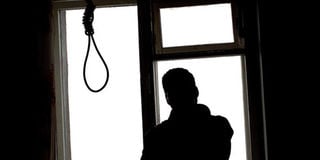Why it's tough being a uniformed officer

Suicidal thoughts. Research indicates that the pressures of law enforcement put police officers at risk of high blood pressure, insomnia, depression, PTSD, which eventually leads to sociopathic behaviour. PHOTO | FILE | NATION MEDIA GROUP
What you need to know:
- The National Alliance on Mental Health says that at least one in four police officers has suicidal thoughts at some point in their life.
- Psychologist Wahome said society's perception that police and military officers are strong is equally detrimental.
A sudden loud bang followed by the combat vehicle ahead of theirs being hurled into the air. Then a cloud of dust. That is what Constable K. Talam (who requested that we use only one name) recalls.
Normally, the entire convoy would stop, just in case another improvised explosive device (IED) had been planted by Al-Shabaab militiamen.
All the soldiers in the eight vehicles in the convoy cocked their guns and directed them at the bushes in Bulla, Mandera County.
Talam and the rest of the police officers stood guard as the senior most officer made a distress call to the regional police commander, informing him that Mandera Governor Ali Roba was in danger.
“I recall his words, ‘I believe all officers in the first Alpha Papa vehicle are fatally injured’. Although I tried to put on a brave face, I was shaking with fear, pain and disgust. I was thinking about my friend Abdi, who was in the vehicle, and hoping he had miraculously survived.”
HAUNTED
In a few minutes, the reinforcement arrived. The dust had settled and it was time for Talam to take orders on the governor’s evacuation and clearing the area.
“Clearing the area meant removing the officers’ badly charred bodies. It was now clear that all of them, including my best friend Abdi, had died and there was no option but to put their bodies into the other vehicles and take them away,” he said.
Although the attack occurred on October 7, 2015, Talam says the scene still haunts him.
Beneath his calm exterior is a man battling post-traumatic stress disorder (PTSD), which was diagnosed only in January this year. He is currently undergoing treatment.
“The images of that fateful day and several others really bogged my mind, and I felt as if there was a tiny box in my brain that was filling up with a cocktail of pain, bitterness, anxiety, uncertainty, fear, pity and regret.
"Life slowly lost meaning as I continued living in Mandera and, gradually, I became an alcoholic,” he said, adding that a friend asked him to seek psychological help.
STRESS
Talam is one of the many members of the uniformed forces suffering form PTSD, yet the circumstances in which they work, as well as society’s expectations and perception of them, does not give them a chance to seek help.
The World Health Organisation estimates that one in every four members of the uniformed forces suffer from PTSD
Mr Julius Kamau, a security risk management professional and PhD student in security and police studies, in his journal, Behind the shiny crown, stress a silent killer among police officers, says police-work entails an extraordinary degree of occupational stress.
“Not only do officers face the prospect of death and violence in the line of duty, but administrative matters, and their relationships with the public, present additional stressors.
“But then, our police officers are trained to be strong and tough to handle any situation that might be thrust at them. If an officer shows signs of depression, stress or anxiety, he or she believes that others, or the system, will perceive them as weak or ineffective at work,” he says.
SUICIDE
He pointed out that police officers are human and just as susceptible, if not more, to mental disorders as the rest of society.
Research indicates that the pressures of law enforcement put police officers at risk of high blood pressure, insomnia, depression, PTSD, which eventually leads to sociopathic behaviour.
The National Alliance on Mental Health says that at least one in four police officers has suicidal thoughts at some point in their life, and that the rate of suicide among police officers is four times that of firefighters.
“Compared to the general population, law enforcement reports much higher rates of depression, PTSD, burnout, and other anxiety-related mental health conditions,” the alliance says.
WORKING CONDITIONS
Psychologist Mary Wahome says that despite scarce availability of data on how many members of the disciplined forces suffer from PTSD, the numbers are likely to be high.
“This is a section of the population that lives in isolation, in camps where the level of interaction is very low. And when it exists, the person you are interacting with is suffering equally, or even worse.
"Secondly, they are silenced by the forces they work for. They are not allowed to talk about it. Generally, expression is hard for them,” Ms Wahome says.
She added that the perception by society that the police and military officers are strong is equally detrimental.
“These are human beings who have feelings; they love; they get hurt; they have emotions. When the public and the authorities expect them to be tough, they lack who to turn to,” she said.
A KDF soldier we interviewed said he was once told to “toughen up, go home and have a beer; the feeling will eventually die”.
The military did not respond to our e-mails pertaining PTSD, and Major (Rtd) Lucy Wairimu, who has been instrumental in dealing with PTSD among soldiers, said data on the disorder was “the military’s secret”.





